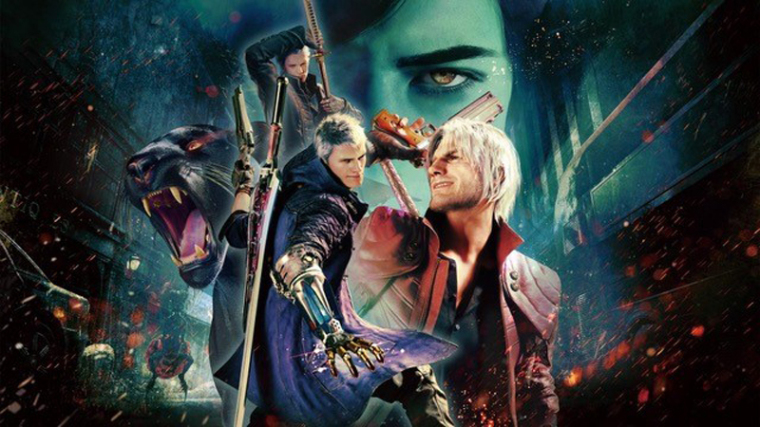
Devil May Cry is a series of hack-and-slash video games featuring a slew of characters with half and quarter demon heritage who use their demonic powers and human determination to fight against forces of hell. Flashy visuals and a fusion of electronic metal music make the games all the more appealing to gamers looking to release some built-up anger.
Sounds pretty Christian right? Nah, yeah I know, but this game series has a surprising amount of themes that either reflect ideas in Christianity or can resonate with Christians.
Note: this article contains spoilers for the Devil May Cry videogames.
The existence of Christian themes in Devil May Cry is not entirely unsurprising, given that the game takes inspiration from Dante Alighieri’s epic Christian-mysticism poem, The Divine Comedy. In the DMC games, main characters Dante, Vergil and Nero are all descendants of a legendary demon-knight named ‘Sparda’, who is worshipped and renowned, not unlike how Jesus is in Christianity.
The franchise didn’t become known for its heart-wrenching (albeit sometimes corny) storytelling until the third game, which carried on into its fourth and fifth instalments; not so much in the poorly-received reboot that released in the 11-year gap between these games.
Themes and motifs throughout the series include family, power, and the conflict between the main character’s clashing heritage – demon and human.
Power and family
The ever-human ambition to attain more power is a core theme to the DMC games, and while it glorifies having power (specifically, crazy superpowers that are really fun to use in the game), the story shows that pursuing power over things like family leads to spiritual corruption. Dante’s twin brother, Vergil, pursues power above all else throughout the series, and it causes him to continually lose touch with his human side, undergoing transformations that nullify any humanity left in him, becoming a demon.
Finding family is also another recurring theme, and it ties into the theme of power. Dante continually tries to save his brother Vergil from falling into darkness, a result of Vergil’s quest for power. Vergil’s obsession with power also stems from a family issue, as he was not able to protect his mother who died in a demonic attack.
Nero is a newer addition to the DMC family, and was an orphan before it was revealed that Vergil and Dante were his father and uncle, respectively. Toward the end of the fifth game, Nero tries to stop Dante and Vergil from killing one another, refusing to lose them after only just discovering they’re related. But it’s not until Nero embraces his demon side that he gains the power needed to defeat both of them and heal his broken family.
Sparda as an allegory for God
This leads into my next point, the correlation between the characters facing their demons and accepting their infernal heritage. In the early games, Dante rejects both his demon heritage and his father, though without the blessing of his demon powers, he can’t make a living through his gun-for-hire business.
Eventually, Dante comes to terms with his demonic side and embraces his dual heritage, and he’s better off for it as it helps him gain the power needed to defeat his enemies and ultimately meet his nephew. Nero’s journey mentioned previously follows a similar direction.
In Devil May Cry, Sparda and the demonic side of these characters represents God, it’s not until they accept that this force is part of their lives that they are able to overcome their obstacles. While we may not have to accept a demonic spirit, there is a similarity to how Christians need to accept God in order to overcome the trials we face. The powers gained by these characters through their demon heritage also reflects the power of God demonstrated through miracles being performed by characters such as Moses in the Old Testament.
The Trinity – V, Vergil and Urizen
In the fifth game, there is symbolism of the trinity from Christian belief that manifests through three characters, Vergil, V, and Urizen. V is one of Devil May Cry 5’s protagonists, and Urizen is the main antagonist. Toward the end, it is revealed that V and Urizen are both halves of Vergil. Having split his soul between two bodies, Vergil once again fully embraces his demon side in the form of Urizen, but unintentionally embraces his human side through V. Three separate entities, yet also one individual entity – Vergil. The fact that Vergil is essentially the son of the Devil May Cry universe’s god, Sparda, strengthens the validity of this symbolism.
The reboot
In 2013 DMC: Devil May Cry was released, a more westernized reboot of the series with different gameplay and a story which served as an allegory for a society in moral decline. The reboot wasn’t very popular amongst Devil May Cry fans, and reinvented the main character of Dante into a debauched character who was a ‘Nephilim’, which in the game is a demon-angel hybrid. Other than taking from some Abrahamic language, the themes in DMC: Devil May Cry do not particularly resonate with Christianity anywhere near as much as the canon games do.
Devil May Cry shows that humans struggle in coming to terms with their spiritual nature, only while the fictional characters wrestle with their demon side, Christians (and many other religious people alike) struggle with a righteous path.
The exceedingly popular Devil May Cry: V awaits a special edition being released to coincide with the launch of the PlayStation 5 and Xbox Series X.

Jackson Reid is a journalism student currently studying at University of Wollongong in Australia. He has been working casually at Pulse 94.1, a Christian radio station, for the last 5 years. He is particularly passionate about youth and kids ministry at church.